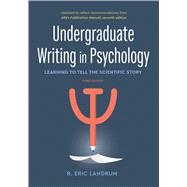This accessible, practical guide to undergraduate writing takes the reader step by step through the process of developing research questions or theses, conducting literature searches, analyzing and synthesizing the literature, writing the paper, and more. Students will learn how to analyze and organize ideas for literature reviews, as well as how to prepare each section of a scientific research paper (introduction, method, results, discussion).
This updated edition is full of:
- advice and resources, including a checklist and self-quiz;
- a sample grading rubric that an instructor might use;
- example reference formats; and
- several before-and-after writing samples showing marked-up changes.








